Germany, whose Chancellor Angela Merkel issued a call for unlimited numbers of migrants to travel to Europe in 2015, has also made the highest number of attempts to return migrants to other EU countries.
Dublin asylum regulations permit member states to attempt to return asylum seekers to the first European Union country the migrants arrived in.
According to figures released by Eurostat Thursday, Germany topped the list of attempted returns with 63,326 in 2017, followed by France (41,243), Austria (10,482), and Greece (9,559).
In total, the European Union saw 157,805 outgoing requests to transfer migrants with the biggest receiver of requests going to Germany at 26,927 — slightly higher than Italy (26,627) which as a coastal nation involuntarily became the focal point for boat migrant landings in 2017.
In terms of accepting transfers, the lowest rates were from Austria (35 per cent), Hungary (27 per cent), and Greece (four per cent).
After Chancellor Merkel declared “we can do this” (“wir schaffen das”) in 2015 to accepting unlimited migrants, mostly at the time from Syria, Germany found that after more than a million had taken up the invitation it ‘could not do this’ on its own, and worked with the European Union on a migrant redistribution programme which the bloc insisted was not optional.
Germany and France to Europe: Accept Migrants or Pay Up https://t.co/hc72ZJt8gh
— Breitbart London (@BreitbartLondon) December 7, 2018
Slovakia and the Czech Republic were the first to voice their opposition to the plan in late August 2015, with Slovak then-Prime Minister Robert Fico saying at the time, “We strongly reject any quotas … If a mechanism for automatic redistribution of migrants is adopted, then we will wake up one day and have 100,000 people from the Arab world and that is a problem I would not like Slovakia to have.”
Initially, Poland’s left-liberal Civic Platform-led coalition government pledged to accept 5,000 migrants in September 2015. One month later, Law and Justice won an outright majority in national elections, with the conservative party pledging to overturn the previous government’s decision.
Hungary has been the most vocal of the Visegrád nations in its rejection of the EU’s “limitless and permanent” migrant quotas, with nine in ten Hungarians backing the government’s position.
While the EU has threatened sanctions against nations refusing to show sufficient “solidarity” with the bloc’s migration plans, in recent days France and Germany have suggested instead that countries like Hungary and Poland either accept migrants or pay more into the EU budget or towards development programmes in Africa.

COMMENTS
Please let us know if you're having issues with commenting.